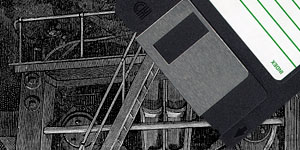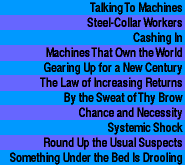


Something Under the Bed Is Drooling
People always get what they ask for; the only trouble is that they never know, until they get it, what it actually is that they have asked for.Squeezing ourselves out of industrial and information processes isn't new. We've always wanted things better, faster, cheaper, and shinier. The difference today is that the computer, being mostly a bundle of facts that can manipulate other bundles of facts, lets us get our wishes on a grand scale---and with ever-escalating ease. Everything suggests that we're in for ever-more and ever-faster job turnover.
Aldous Huxley
It seems likely that tomorrow's jobs will become more fluid. To be hired, job seekers will have to assure prospective employers that they can learn new things and change what they do every few years. Of course, that requirement will vary from market to market; biotechnology or infotechnology companies will need more employee adaptability than farming or mining. Still, it will hold for all markets to some degree and will do so increasingly as the decades go by. So perhaps the wisest advice any young jobseeker can get today is: Plan for a job change every three years. The life you save may be your own.
But is that really true? At the turn of the century it was confidently predicted that New York City would soon drown in manure because of the enormous number of horses then deemed essential. The futurists of the time completely misread the significance of the horseless carriage. And when the car was invented, no one predicted gridlock, drive-through fast-food businesses, smog, or teenage car rituals. Again, in 1967, a company making slide rules (primitive computation aids) commissioned a study of the future. The study predicted domed cities and three-dimensional television in a hundred years. But it utterly failed to predict the death of the slide rule---the company's own main product---within just five years. Perhaps some future event will similarly confound the predicted paradigmatic change.
It's hard to see how that could happen though. We can jump into bed and pull the blanket over our heads, but the monster will still be there. Because it is within us.
In Germany in the years following the First World War, millions of perfectly normal Germans, suffering the economic aftershocks of the war and a worldwide depression, agreed among themselves that German Jews were to blame. In April 1933 over a thousand years of unthinking bigotry encouraged them to join in, or at least to condone, the rioting and smashing of Jewish shops. But that first step led inexorably to other steps. Ten short years later, millions of Jews were being fed to the gas chambers.
No change comes full-blown right at the beginning. It always comes in a long series of tiny changes, each one seeming reasonable given what's come before. It's only looking back across the sweep of history that we can see that the world that results isn't the world we know at all. It's something alien.
We're accustomed to slow generational change. That's been our experience of social change for the past five thousand years, because that's been the pace of technological change for all that time. In 1970, the futurist Alvin Toffler wrote of a new condition coming to humanity, future shock. He meant that the pace of change was increasing so fast that we would soon live in a world where major changes happen far faster than once every few generations. At the dawn of the twenty-first century, we're already living in that world.
Our future is what we make it, some say. But the implicit choices we make as a species aren't always what we want individually. Too many times before have many short-term solutions added up to long-term misery for us to be overly optimistic as we stumble backward into our future.
Meteorologists have a saying: Tomorrow's weather will be much like today's, except a little different. For those of us willing to keep learning in our jobs the future should be brighter, less stormy, and a whole lot more fun. But for many of us tomorrow's job market will be much like today's---only a little stranger, a little scarier, and perhaps a little colder.